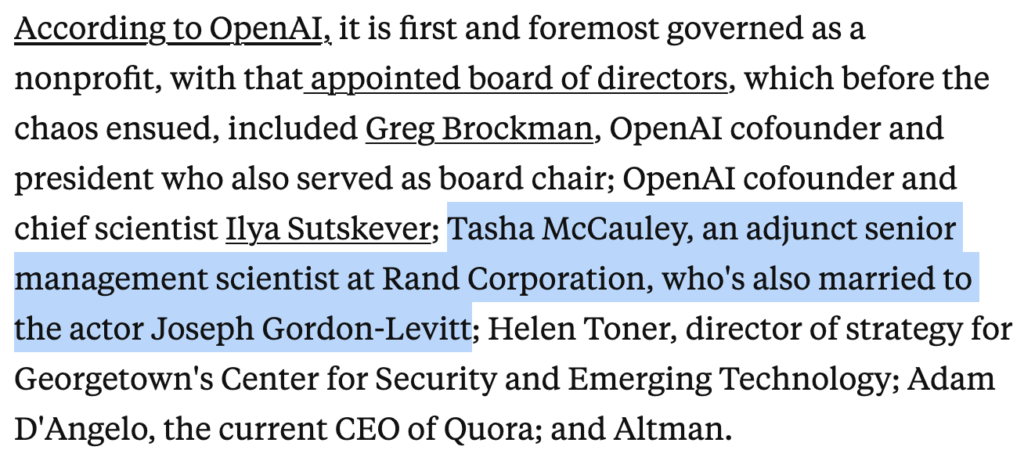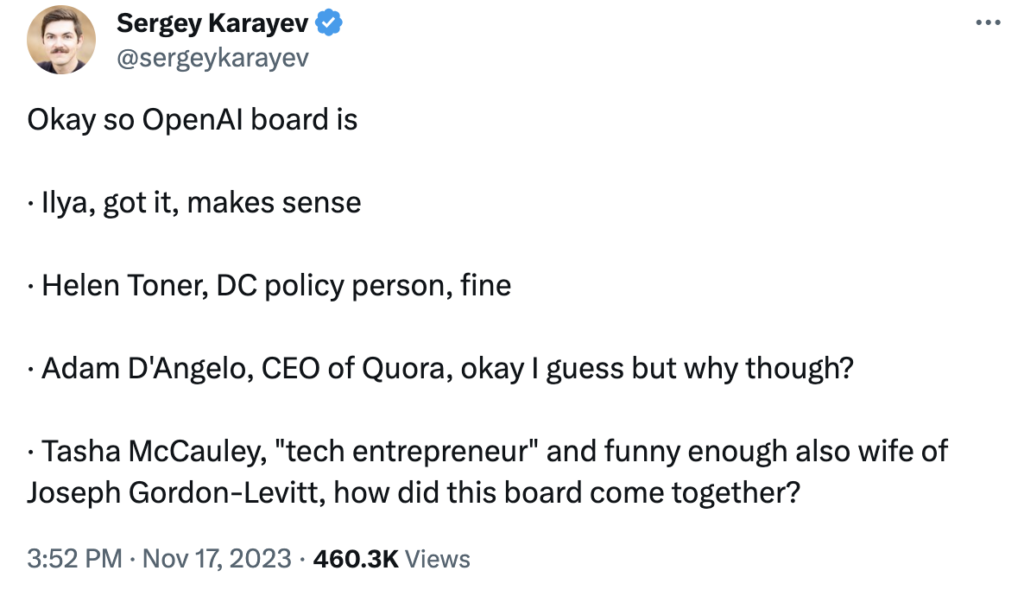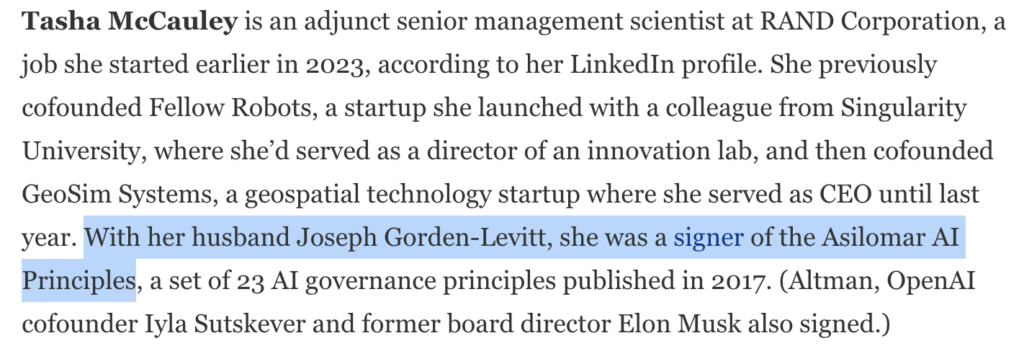Why do we care?
Did you ever read articles about famous actors who married non-actors and think to yourself wow, that could be me? Yeah, me neither…
I remember talking about it with my mom, marveling at how certain actors who married “normies” (as I learned we call them via DeuxMoi) managed to keep their personal lives out of the spotlight while their co-stars were snapped by paparazzi while buying a latte at their neighborhood coffee shop. One name that frequently came up was Joseph Gordon-Levitt. I’m not ashamed to admit that I’ve loved him since his 10 Things I Hate About You days, and his role in Inception only served to solidify my opinion that he was both a great actor and an adorable embodiment of how nerdy good guys can be sexy as hell.
“Did you know he’s married to some genius scientist?” my mom asked me one day. She told me that he’d married an actual rocket scientist, some insanely smart woman who was building robots for NASA. My love for him soared – a man who supported a smart, driven woman with her own career. Swoon.
I’ll concede that I didn’t dig into any more details about her back then, but the recent drama surrounding OpenAI and Sam Altman thrust this anonymous woman back into the forefront of my mind.
Have you been following the insane roller coaster of a Succession episode that has been the last two weeks in tech? I’ll bet you didn’t even realize that Joseph-Gordon Levitt was even peripherally involved.
And neither did I, until I noticed a familiar pattern in how journalists, bloggers, and commentators were talking about one particular female member of OpenAI’s board…
If your work is even remotely tech-adjacent, I’m guessing you’ve heard about the shocking firing
(and subsequent rehiring) of Sam Altman, CEO of OpenAI and poster boy for both ChatGPT and the overall rise in public interest in AI. For those of us who were desperately hoping to avoid talking politics at the Thanksgiving table, we were given a gift of a new salacious drama to follow throughout the holiday week. Apologies to the poor journalists who had to keep up with the twists and turns while attempting to brine their turkeys.
I’ve worked in a tech- or tech-adjacent area for years now, so I gobbled up (I know, I know…but it was Thanksgiving so give me a break) every new piece of info I could get my hands on, desperately trying to figure out what happened to instigate this spectacular turn of events . And all I have to say is I can’t wait for the book in 5-10 years that finally spells out exactly what Altman was “not consistently candid” about — was it a big lie? A white lie? A malicious lie? One day I hope to find out.
But as I was reading the various articles, tweets, blog posts, etc about what was happening, I was also struck by another interesting phenomenon – how journalists were choosing to talk about OpenAI’s board. As you may have read, OpenAI had an interesting governance structure. Having launched as a non-profit organization, it began taking in outside investment in 2019 (under Altman’s new leadership) and thus created a fascinating confluence of motivations among its executive team and board. The board itself was tasked with prioritizing “principles over profit”, but companies with outside investors are by definition incentivized to maximize returns for their investors – it’s how the the Venture Capital world is able to exist, after all (story for another day).
Needless to say, OpenAI’s board was the focal point of many an article over the last week or so. And one thing stood out to me – the way they discussed one particular female board member and her credentials. Meet Tasha McCauley, one of the four members (six, before Altman’s initial firing) of Open AI’s board that voted to oust him. McCauley is an entrepreneur in the tech and science industries. Currently working as a scientist at the Rand Corporation, she previously held the position of CEO at a geospatial technology company that built large scale virtual cities. I don’t personally know a lot about that particular company, but it feels like an impressive entry on one’s resume and, aside from sounding ridiculously cool and wanting to learn more about it on a personal level, I also trust that it plus her various other experiences qualified her well to sit on OpenAI’s board.
But as we see far too often, people simply couldn’t resist bringing her relationship status into the conversation when discussing her credentials. Because you see, McCauley also happens to be married to a celebrity. I’m sure you’ve guessed it by now, she is that elusive rocket scientist that my mom boasted about Joseph Gordon-Levitt marrying all those years ago. Why is this relevant? Well, sadly, because people made it so last week.
In the numerous articles detailing the OpenAI’s board to fire Altman, many chose (wisely) to give readers more information about who actually sat on the board that made the decision. They outlined each board member’s background and credentials. They highlighted what areas each member focused on in its oversight of OpenAI’s operations. And in the case of Tasha McCauley, they decided they had to spotlight her personal life as well:


There are plenty of other examples, but suffice it to say many outlets felt it vital to mention that McCauley is married to our very own JGL.
So why was it relevant to call out who McCauley is married to? Is it just because it’s a celebrity, and thus a “name brand” that people will recognize? Is it because the writers of these pieces didn’t feel that McCauley had sufficient credentials without calling out that her husband is famous?
I can’t answer those questions without talking to the author of each of these pieces, and frankly I doubt they’d respond to a cold email from some rando starting a tiny blog over here. But their individual motivations aren’t even really the point anyway. The point is that it’s become so ingrained in our society that we should try to find ways to disqualify women in power – even just implicitly. By mentioning her husband, these articles have planted a small seed of doubt in the minds of readers. Is he mentioned because he’s the real reason she got the seat on the board in the first place?
This tweeter seems to think so…

This writer goes so far as to spout the (self-proclaimed) conspiracy theory that the “inexperienced” board must have just binged the show Super Pumped, starring JGL himself.
To their credit, at least these writers mentioned that JGL had a hand in signing the Asilomar AI Principles aimed at kick-starting the conversation around AI governance. So they’ve at least attempted to justify including JGL’s name in their articles somehow:

But was it necessary to call out that he signed it too? Did it add anything to the story?
Whether the writers of these pieces intended it or not, they’ve belittled this woman’s professional qualifications in the hopes of gaining more traffic to their websites. And to be honest, I don’t blame them – it’s a behavior that’s become so common so as to be habitual in our day-to-day discourse.
And that’s why I’m here. To call out these seemingly benign examples of how we talk about women in power and try to shift the narrative just a tiny bit. Maybe we don’t need to mention a woman’s husband every time we talk about her professional accomplishments. Maybe we can just let her work speak for itself, the way we so automatically do for men in similar positions.
More to come, we’re just getting started.
